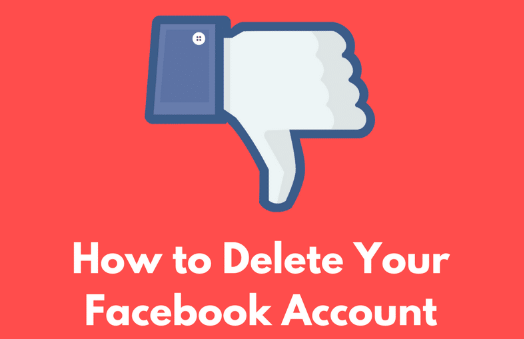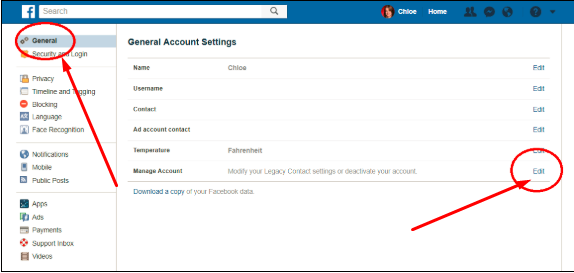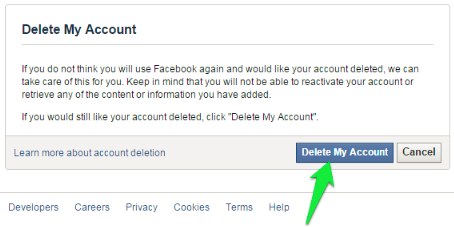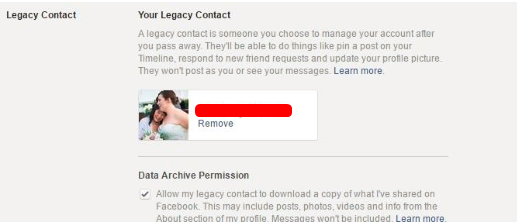Deleting Your Facebook Account 2019
By
MUFY UJASH
—
Aug 23, 2019
—
Deleting Facebook Account
Recent events might have you contemplating a break from Facebook. That's not an option for everyone; in that instance, just tighten up your account settings. Deleting Your Facebook Account: Yet if having your data mined for political objectives without your authorization illustrations you out, there are ways to liberate yourself from the substantial social network.
If you await a social media sites break, right here's how to erase Facebook.
Deleting Your Facebook Account
Deactivating
Facebook offers you two choices: 2 options: deactivate or remove
The initial couldn't be easier. On the desktop, click the drop-down menu at the top-right of your screen as well as select settings. Click General on the top left, Edit next to "Manage Account" Scroll down and also you'll see a "Deactivate My Account" web link at the bottom. (Here's the direct link to make use of while visited.).
If you're on your mobile phone, such as making use of Facebook for iOS, similarly most likely to settings > Account settings > General > Manage Account > Deactivate.
Facebook doesn't take this gently - it'll do whatever it could to keep you about, including psychological blackmail about just how much your friends will certainly miss you.
As such, "Deactivation" is not the like leaving Facebook. Yes, your timeline will disappear, you won't have accessibility to the website or your account via mobile apps, friends can't post or contact you, as well as you'll shed access to all those third-party services that make use of (or require) Facebook for login. However Facebook does not delete the account. Why? So you can reactivate it later on.
Simply in case that anticipated re-activation isn't in your future, you need to download a copy of all your data on Facebook - posts, photos, videos, talks, and so on-- from the settings menu (under "General"). Exactly what you locate might amaze you, as our Neil Rubenking figured out.
Account Deletion
To fully erase your Facebook account forever and ever, most likely to the Erase My Account page at https://www.facebook.com/help/delete_account. Simply realize that, per the Facebook data use policy "after you remove info from your account or delete your account, copies of that info could remain readable somewhere else to the degree it has been shown to others, it was otherwise distributed according to your personal privacy settings, or it was copied or kept by other customers.".
Translation: if you created a comment on a friend's standing update or picture, it will certainly continue to be after you delete your personal account. Some of your posts and also pictures might hang around for as long as 90 days after deletion, too, however simply on Facebook servers, not survive on the website.
Removal in behalf of Others
If you intend to alert Facebook about a customer you recognize is under 13, you could report the account, you narc. If Facebook can "sensibly confirm" the account is used by somebody underage-- Facebook prohibits children under 13 to comply with government legislation-- it will delete the account quickly, without informing any individual.
There's a separate form to demand removal of accounts for people that are clinically incapacitated and therefore incapable to make use of Facebook. For this to work, the requester should prove they are the guardian of the individual in question (such as by power of attorney) in addition to offer an official note from a medical professional or medical facility that spells out the incapacitation. Redact any type of details required to keep some privacy, such as clinical account numbers, addresses, etc.
If a user has died, a tradition get in touch with-- a Facebook pal or loved one who was marked by the account owner before they died-- could obtain accessibility to that individual's timeline, when approved by Facebook. The legacy call could should offer a link to an obituary or various other documents such as a death certificate. Facebook will "hallow" the web page so the dead timeline survives (under control of the legacy contact, that cannot publish as you), or if preferred, remove it.
Designate a particular legacy contact person to handle your account after your passing away. You could locate that under settings > General > Manage Account > Your Legacy Contact. When you set one up, you'll get a notice annually from Facebook to check that the contact ought to stay the same, unless you pull out of that. You can additionally take the additional action of seeing to it that after you pass away, if the tradition call does report you to Facebook as dead, your account gets removed (even if the legacy contact wants the timeline to be hallowed).
If you await a social media sites break, right here's how to erase Facebook.
Deleting Your Facebook Account
Deactivating
Facebook offers you two choices: 2 options: deactivate or remove
The initial couldn't be easier. On the desktop, click the drop-down menu at the top-right of your screen as well as select settings. Click General on the top left, Edit next to "Manage Account" Scroll down and also you'll see a "Deactivate My Account" web link at the bottom. (Here's the direct link to make use of while visited.).
If you're on your mobile phone, such as making use of Facebook for iOS, similarly most likely to settings > Account settings > General > Manage Account > Deactivate.
Facebook doesn't take this gently - it'll do whatever it could to keep you about, including psychological blackmail about just how much your friends will certainly miss you.
As such, "Deactivation" is not the like leaving Facebook. Yes, your timeline will disappear, you won't have accessibility to the website or your account via mobile apps, friends can't post or contact you, as well as you'll shed access to all those third-party services that make use of (or require) Facebook for login. However Facebook does not delete the account. Why? So you can reactivate it later on.
Simply in case that anticipated re-activation isn't in your future, you need to download a copy of all your data on Facebook - posts, photos, videos, talks, and so on-- from the settings menu (under "General"). Exactly what you locate might amaze you, as our Neil Rubenking figured out.
Account Deletion
To fully erase your Facebook account forever and ever, most likely to the Erase My Account page at https://www.facebook.com/help/delete_account. Simply realize that, per the Facebook data use policy "after you remove info from your account or delete your account, copies of that info could remain readable somewhere else to the degree it has been shown to others, it was otherwise distributed according to your personal privacy settings, or it was copied or kept by other customers.".
Translation: if you created a comment on a friend's standing update or picture, it will certainly continue to be after you delete your personal account. Some of your posts and also pictures might hang around for as long as 90 days after deletion, too, however simply on Facebook servers, not survive on the website.
Removal in behalf of Others
If you intend to alert Facebook about a customer you recognize is under 13, you could report the account, you narc. If Facebook can "sensibly confirm" the account is used by somebody underage-- Facebook prohibits children under 13 to comply with government legislation-- it will delete the account quickly, without informing any individual.
There's a separate form to demand removal of accounts for people that are clinically incapacitated and therefore incapable to make use of Facebook. For this to work, the requester should prove they are the guardian of the individual in question (such as by power of attorney) in addition to offer an official note from a medical professional or medical facility that spells out the incapacitation. Redact any type of details required to keep some privacy, such as clinical account numbers, addresses, etc.
If a user has died, a tradition get in touch with-- a Facebook pal or loved one who was marked by the account owner before they died-- could obtain accessibility to that individual's timeline, when approved by Facebook. The legacy call could should offer a link to an obituary or various other documents such as a death certificate. Facebook will "hallow" the web page so the dead timeline survives (under control of the legacy contact, that cannot publish as you), or if preferred, remove it.
Designate a particular legacy contact person to handle your account after your passing away. You could locate that under settings > General > Manage Account > Your Legacy Contact. When you set one up, you'll get a notice annually from Facebook to check that the contact ought to stay the same, unless you pull out of that. You can additionally take the additional action of seeing to it that after you pass away, if the tradition call does report you to Facebook as dead, your account gets removed (even if the legacy contact wants the timeline to be hallowed).








